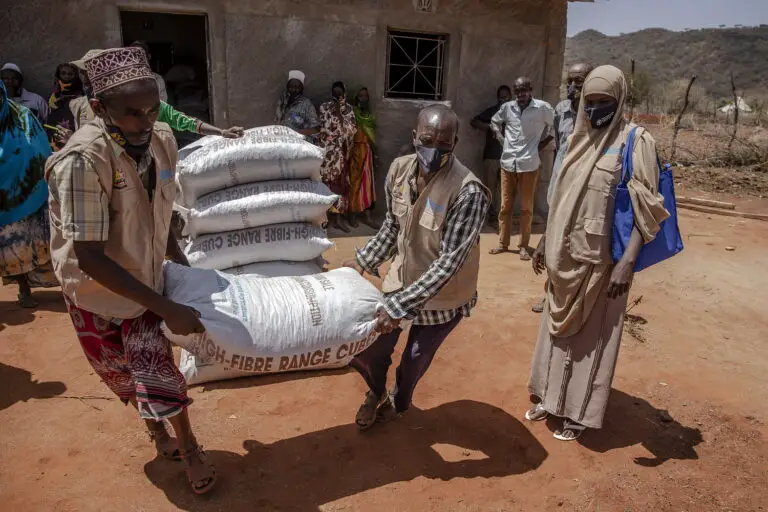- Empowering the Future: Humanity Protocol’s Dream Play Initiative
- TikTok Community Guidelines update aims to curb hate speech and misinformation
- Rwanda sees 39% surge in bank borrowers as Sacco and MFI loan uptake declines
- Kenya Ports Authority wins dispute case over cargo release
- Why Africa can reap billions from digital economy
- Africa private capital deals drop 28 per cent amid global economic turmoil
- Saudi Islamic Development Bank to the rescue of Uganda with $295 million loan
- Reshaping the future of sustainable food systems in Africa
Browsing: Sustainable Development Goals
- Eastern Africa and Western Africa account for 70 per cent of Africa’s population unable to afford a healthy diet.
- About 30 per cent of Africa’s children bear the indelible mark of stunted growth, a cruel consequence of malnutrition.
- Burkina Faso, Djibouti, Mali, Mauritania, and Niger emerged with the highest prevalence rates of child wasting above 10 per cent.
Food crisis in Africa is deepening with a new report showing that an estimated one billion people in the continent are unable to afford a healthy diet. Painting a grim picture for the continent, the Africa Regional Overview of Food Security and Nutrition – Statistics and Trends 2023 report adds that a total of 282 million people in Africa, roughly 20 percent of the population, including millions of children, are undernourished. This distressing statistic sadly reflects an increase of 57 million people since the onset of the COVID-19 pandemic.
“After a long …
- Across Africa, Public-private partnerships (PPP) experience varies across countries due to GDP differences, capital market size and depth.
- The UN Economic Commission for Africa ECA has been working with African countries to enhance their PPPs for infrastructure development.
- ECA has been undertaking capacity building and helping economies in Africa to mobilize resources for infrastructure development.
Public-private partnerships (PPPs) are crucial to closing the financing gap for infrastructure development in Africa, and governments and the private sector should work together to create effective PPPs, said Dr Robert Lisinge, Acting Director of the Private Sector Development and Finance Division at the UN Economic Commission for Africa (ECA).
He was speaking last week at a plenary session of the African Economic Conference 2023 on Public-Private Partnerships to catalyse infrastructure development and innovative financing for industrialization in Africa.
“Financing Africa’s infrastructure is still a big challenge faced by many countries on the continent. To …
As part of the requirements under the Kenyan Act, the government additionally established an Integrated Monitoring Reporting and Verification (Integrated MRV) system and published Kenya’s National Climate Change Action Plan 2018-2022 (NCCAP). The five year plan requires the government to develop “action plans”, providing mechanisms to assist stakeholders in bringing about low-carbon climate-resilient development.
Angola boasts some of the most ambitious targets for transition to low carbon development in Africa, albeit having ratified the Paris Agreement in November 2020. Since then the country has launched a national development plan, established a climate observatory and implemented a continuous national emissions monitoring system.
In addition, Gambia is committed to reducing its GHG emissions unconditionally, by 2.4 per cent by 2025 having implemented the Sustainable Energy Action Plan in 2015, which sets out the country’s renewable energy targets and corresponding measures necessary for their achievement. It has also committed to terminating oil importation …
The competition will provide an opportunity for the Summit to showcase the best small businesses at the Pre-Summit to be held in Rome in July 2021.
Listening to the diverse voices of small businesses – from veterinary surgeries to cafes, producer cooperatives and digital start-ups – is a key component of the Summit process to identify bold, new solutions for improving food systems.…
Countries in sub-Saharan Africa are unprepared to equitably use, adopt and adapt to the ongoing technological revolution.…
More than half of the population in 34 out of 38 sub-Saharan Africa nations lack access to basic handwashing facilities. …
Gold accounts for 77 per cent of the US$40 billion worth of under invoiced extractive commodity exports from Africa.…
GreenCo Power Services, a subsidiary of Africa GreenCo has received a total of USD 1.5 million through two deals. The Danish government’s Investment Fund for Developing Countries (IFU) has committed $1 million in funding. InfraCo Africa, the investment arm of the Private Infrastructure Development Group also put in $500 000 through a convertible loan.
The deal will see GreenCo Power services come to life to strengthen power generation capacity. Renewable energy generation will provide an innovative approach to electricity production which is set to drive Zambia’s power infrastructure significantly.
The Zambian government is on the path to scaling up energy which ties in with the country’s vision to be a prosperous middle-income country by 2030. As part of its vision, the country intends to shore up energy availability to drive productivity in the country. This deal will therefore see GreenCo acting as a complementary partner to the Zambian government’s vision. …
The vulnerability of Kenya’s food system has been exposed through the Covid-19 pandemic.…
Africa continues to face difficulties in achieving the more robust and sustained growth path that is needed to enhance living standards across the continent…
